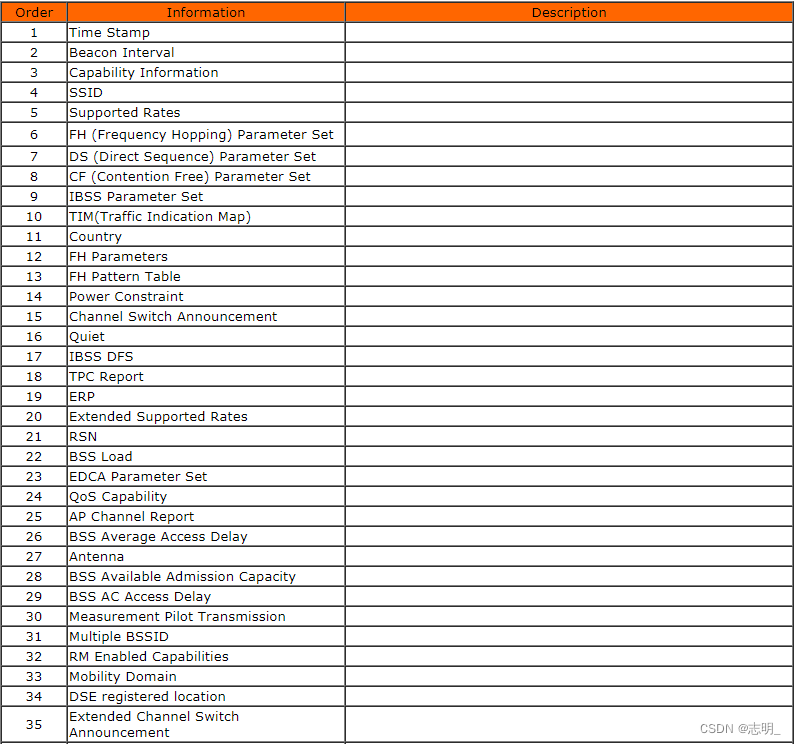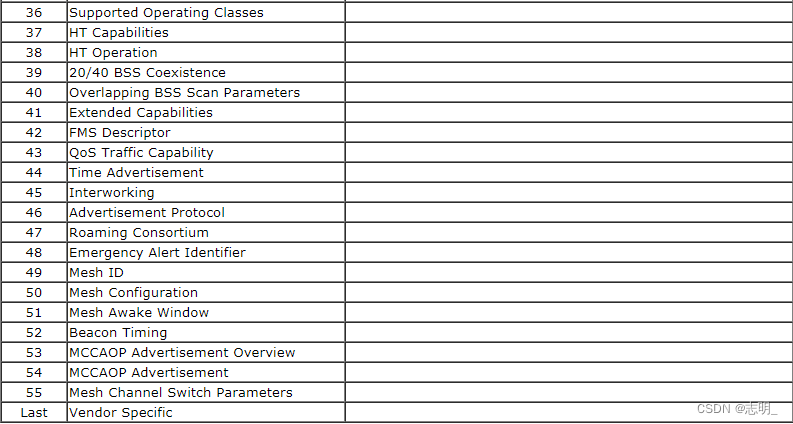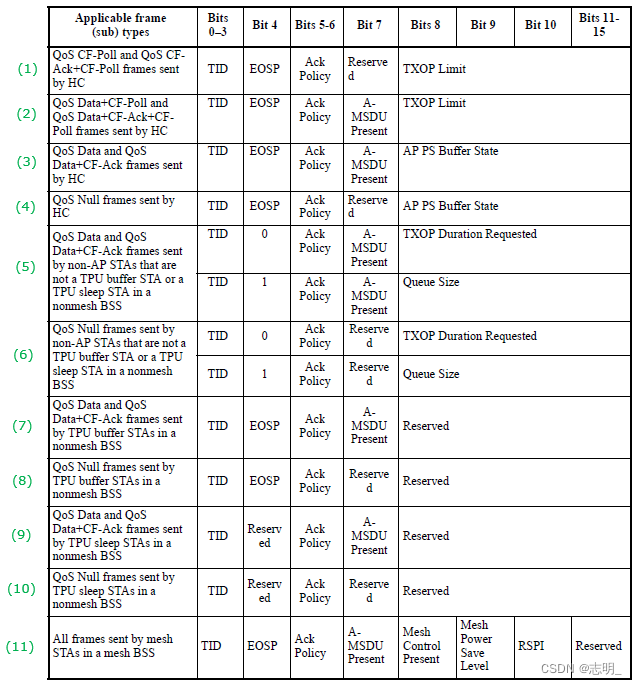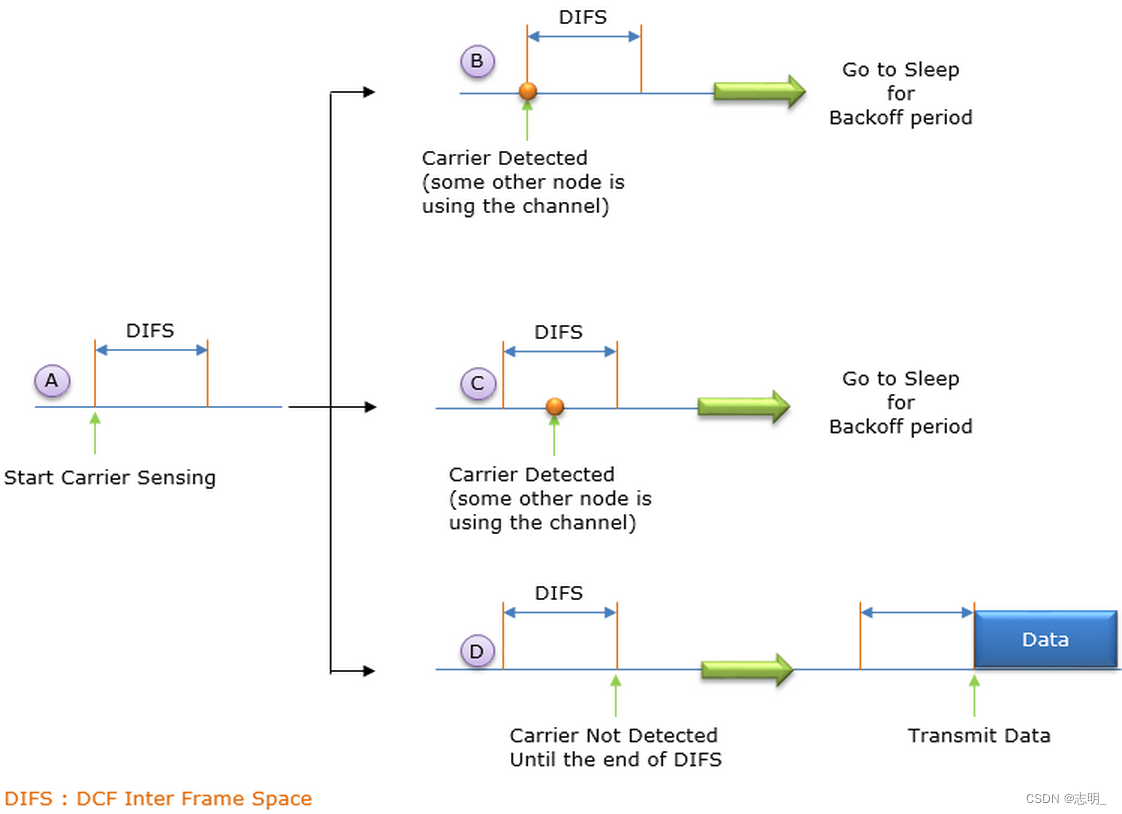目录
一、基本介绍(Introduction)
二、进化发展(Evolution)
三、PHY帧((PHY Frame )
四、MAC帧(MAC Frame )
五、协议(Protocol)
六、安全(Security)
七、802.11ac标准
八、802.11ad标准
九、802.11ax ( WiFi 6 )标准
十、WiFi直接连接(WiFi Direct)
十一、测试(Testing)
十二、WiFi射频测量(WiFi RF Meas.)
https://www.sharetechnote.com/
*一、基本介绍(Introduction*)
1、总体网络架构(Overall Network Architecture)
使用WLAN的最常见方式如下。在大多数情况下( In most case),主通信线路将是有线线路,我们将AP(Access Point接入点)连接到有线骨干网(wireline backbone),如下所示(as shown below)。接入点是一种与客户端设备client device(如笔记本电脑Laptop或智能手机)通信并通过有线主干(wireline backbone)传输(convey)数据的设备。接入点有两个不同的接口(interface),一个用于使用有线协议(wireline protocol)连接到有线骨干网,另一个用于通过无线协议(wireless protocol)与各种移动设备通信。
当我们在技术上说WLAN时,它通常是指在无线通信方法中用于连接移动客户端(mobile client)和接入点的技术。我将发布(post)的页面也将是关于移动客户端和接入点之间的无线通信技术。
WLAN(Wireless Local Area Network无线局域网)基本上是一种设置(setup),可以让你在不使用任何电缆(cable)的情况下将笔记本电脑(laptops)、手机或平板电脑(tablet)等设备连接到互联网。无线局域网的主要部分是接入点(APs)、无线设备(wireless devices)和有线骨干网(wired backbone)。
当你将设备连接到Wi-Fi时,它会与接入点通信,然后接入点通过有线骨干网将你的数据发送到需要的地方。这种设置可以让你在没有任何电缆的情况下使用互联网和共享数据,这非常方便(pretty convenient)。
1)接入点(APs)就像是无线设备和有线网络之间的中间人(middleman)。它们会产生一个Wi-Fi信号,这样你就可以将你的设备连接到互联网上。当你有很大的空间需要覆盖时,你可能需要多个AP来确保你在任何地方都能得到良好的覆盖(coverage)。
2)无线设备(wireless devices)是你用来连接Wi-Fi的设备,比如你的手机、笔记本电脑或平板电脑。他们有一个无线适配器(wireless adapter),可以使用Wi-Fi信号与接入点通话。
3)有线主干网(wired backbone)连接所有接入点和其他网络设备,如交换机(switch)或路由器(router)。它有点像整个系统的主干,确保数据到达需要的地方。它使用以太网电缆(Ethernet cable)将所有东西连接在一起,有时甚至使用光纤电缆(fiber-optic cable)来实现更快的速度和更长的距离。
2、协议栈(Protocol Stack)
顾名思义(As the terminology implies),WLAN也是LAN(局域网Local Area Network)的一种,因此它使用了标准LAN协议的大部分,尤其是在更高层。唯一的区别是非常低层的部分(PHY和低MAC)。我将要处理(deal with)的大部分内容将是关于协议栈(protocol stack)的PHY/MAC部分。
让我们以一种更随意的(casual)方式来分解(break down)它,重点关注(focus on)Wi-Fi协议栈和三个主要层:物理层(PHY/Physical)、媒体访问控制层(MAC/Media Access Control)和互联网协议层(IP/Internet Protocol)。
1)物理(PHY)层:
物理层就像无线网络的无线电台(radio station)。它负责(take care of)将您的数据转换为可以通过空中发送的无线电信号(radio signal)。不同的Wi-Fi版本(如802.11a、b、g、n、ac和ax)使用不同的方法和射频(RF:radio frequency)以不同的速度和距离发送数据。它也有一些技巧(trick)来检测(detect)和修复(fix)传输过程中可能发生的错误。
2)媒体访问控制(MAC)层:
MAC层就像一个交通警察(traffic cop),确保所有使用Wi-Fi的设备都能很好地配合使用。由于每个人共享相同的无线电波(airwave),MAC层使用一个名为CSMA/CA的系统来帮助设备确定(figure out)何时轮到他们说话。它还负责(in charge of)寻址(addressing)等事务,以便数据到达正确的位置,并在需要时将大块数据(big chunks)分解(break into)成小块(smaller pieces)。
3)互联网协议(IP)层:
IP层本身并不是Wi-Fi的一部分,但它对于让一切协同工作非常重要。这就像是你的数据的GPS,为每个设备提供一个地址,并帮助你的信息从一个地方找到另一个地方,即使它必须通过(go through)不同的网络。有几个(a couple of )不同版本的IP,如IPv4和IPv6,可以帮助实现这一点。
因此,简言之(in a nutshell),Wi-Fi协议栈有负责处理无线电信号的PHY层,有帮助设备共享无线电波的MAC层,还有将数据引导到需要的地方的IP层。它们一起确保你可以毫无障碍地(without a hitch)连接Wi-Fi和上网(surf the web)。
3、安全(Security)
安全就是保护你的Wi-Fi网络免受黑客和爱管闲事的邻居(hackers and nosy neighbors)的攻击。有不同的方法来保护你的网络,比如使用密码和加密(encryption)。WPA2和WPA3是确保Wi-Fi安全和数据安全的最佳选择(option)。
注意:WiFi安全的更多细节(Further details)在此处的单独注释(separate note)中进行了解释。
4、网络管理(Network Management)
管理Wi-Fi网络意味着确保一切顺利运行。你需要规划网络,设置它,关注(keep an eye on)它的运行情况,解决问题(fix problems),并随着时间的推移使其变得更好。有一些工具和软件可以帮助网络管理员(network admin)完成所有这些工作。
5、服务质量(QoS/Quality of Service)
QoS是指确保网络上的重要内容((important stuff)得到优先(priority)考虑。例如,如果你正在流媒体播放电影(stream a movie)或进行视频通话(video call),你不希望因为别人正在下载(download)一个巨大的文件而速度缓慢或断断续续(choppy)。QoS通过优先考虑重要的东西来帮助保持一切顺利运行。
6、漫游(Roaming)
漫游是指当你带着设备四处移动(move around)时,它会自动切换(switch)到最佳的Wi-Fi信号。它在办公室或校园(campuse)等有很多不同Wi-Fi接入点的大地方非常有用。漫游可以确保您保持联系,不会出现任何问题(without any hiccups)。
7、范围和覆盖范围(Range and Coverage)
范围和覆盖范围是关于你的Wi-Fi信号能走多远,以及它覆盖该地区的程度。很多事情都会影响(affect)这一点,比如接入点的功率有多大,它有什么样的天线(antenna),甚至墙上的建筑材料。有时,为了获得更好的覆盖,你可以使用网状网络(mesh network)之类的东西,这有助于扩展(extend)Wi-Fi信号,而不需要更多的电线。
8、基本功能(Basic Features)
WiFi基于半双工(TDD/Half-Duplex)。
使用CSMA/CA(Carrier Sense Multiple Access with Collision Avoidance,带冲突避免的载波侦听多路访问),而有线以太网(wired ethernet)使用CSMA/CD
使用WEP(Wired Equivalent Privacy,有线等效隐私)、WPA(WiFi Protected Access,WiFi保护访问)、WPA2(802.11i)
YouTube
IEEE 802.11 Wireless LAN (WLAN) Part 1 - Fundamental Concepts (Sep 2013)
IEEE 802.11无线局域网(WLAN)第2部分(2013年9月)
IEEE 802.11无线局域网(WLAN)第3部分(2013年9月)
The story of Wi Fi (Mar 2015)
802.11ac Frames - What’s Changed? (Sep 2015)
The Evolution of IEEE 802 11 standards - BAG NAC (Sep 2018)
802.11ax - What’s New Webinar (May 2018)
2018 Wi-Fi Trek - Mark Williams (Wireless Power Saving Mechanisms) (Feb 2019)
Explained: WiFi 1, 2, 3, 4, 5 and 6 (May 2019)
二、信标(Beacon)
信标是从AP(接入点)定期(periodically)广播的一种特殊类型的信号(消息),AP将其ID和能力(capability)携带(carry)到AP周围的每个设备。Beacon的整体框架结构(overall frame structure)如下。
以下是显示信标帧头部分(Beacon Frame Header part)的示例
IEEE 802.11 Beacon frame, Flags: …m…C
Type/Subtype: Beacon frame (0x08)
Frame Control Field: 0x8020
.... ..00 = Version: 0
.... 00.. = Type: Management frame (0)
1000 .... = Subtype: 8
Flags: 0x20
.... ..00 = DS status: Not leaving DS or network is operating in AD-HOC mode
(To DS: 0 From DS: 0) (0x00)
// (To DS: 0 From DS: 0) mean the address 1 is Destination address
// the address 2 is Source address
.... .0.. = More Fragments: This is the last fragment
.... 0... = Retry: Frame is not being retransmitted
...0 .... = PWR MGT: STA will stay up
..1. .... = More Data: Data is buffered for STA at AP
.0.. .... = Protected flag: Data is not protected
0... .... = Order flag: Not strictly ordered
.000 0000 0000 0000 = Duration: 0 microseconds
Receiver address: Broadcast (ff:ff:ff:ff:ff:ff)
Destination address: Broadcast (ff:ff:ff:ff:ff:ff)
Transmitter address: Anritsu_07:91:0e (00:00:91:07:91:0e)
Source address: Anritsu_07:91:0e (00:00:91:07:91:0e)
BSS Id: Anritsu_07:91:0e (00:00:91:07:91:0e)
Fragment number: 0
Sequence number: 78
Frame check sequence: 0xe0fbec2b [correct]
[Good: True]
[Bad: False]
下是Beacon信号的[Frame Body]中携带的信息广播(information broadcast)的列表。并非所有这些信息都是由AP广播的。其中许多字段(fields)仅在特定条件下广播(您可以在802.11 - 8.3.3.2 Beacon frame format中找到更多详细信息)。

以下是信标帧内容的示例。
< Example 1 >
以下是旧802.11规范(specification)中的一个示例,您将看到信标中包含的信息集相对(relatively)较小。将此示例与来自最新(the latest)规范(802.11ac)的下一个示例进行比较,以及功能集(feature set)是如何增长的。





< Example 2 >
这是一个名为Anritsu MT8862的实验性(experimental)AP(接入点)的例子,它支持802.11ac。日志(log)是在这里显示的测试设置中捕获(capture)的。除非您完全理解802.11 PHY/MAC规范,否则很难理解此处显示的所有参数的含义。但是,如果你把这里的所有项目都浏览(go through)了几次(a couple of times),即使你不明白这意味着什么。阅读与802.11相关的其他技术材料或规范将对您有所帮助。(学习任何新事物的第一步是习惯(get used to)它,即使你不了解全部细节)
IEEE 802.11 Beacon frame, Flags: …m…C
Type/Subtype: Beacon frame (0x08)
Frame Control Field: 0x8020
.... ..00 = Version: 0
.... 00.. = Type: Management frame (0)
1000 .... = Subtype: 8
Flags: 0x20
.... ..00 = DS status: Not leaving DS or network is operating in AD-HOC mode
(To DS: 0 From DS: 0) (0x00)
.... .0.. = More Fragments: This is the last fragment
.... 0... = Retry: Frame is not being retransmitted
...0 .... = PWR MGT: STA will stay up
..1. .... = More Data: Data is buffered for STA at AP
.0.. .... = Protected flag: Data is not protected
0... .... = Order flag: Not strictly ordered
.000 0000 0000 0000 = Duration: 0 microseconds
Receiver address: Broadcast (ff:ff:ff:ff:ff:ff)
Destination address: Broadcast (ff:ff:ff:ff:ff:ff)
Transmitter address: Anritsu_07:91:0e (00:00:91:07:91:0e)
Source address: Anritsu_07:91:0e (00:00:91:07:91:0e)
BSS Id: Anritsu_07:91:0e (00:00:91:07:91:0e)
Fragment number: 0
Sequence number: 78
Frame check sequence: 0xe0fbec2b [correct]
[Good: True]
[Bad: False]
IEEE 802.11 wireless LAN management frame
Fixed parameters (12 bytes)
Timestamp: 0x0000000000f3c041
Beacon Interval: 0.204800 [Seconds]
Capabilities Information: 0x0001
.... .... .... ...1 = ESS capabilities: Transmitter is an AP
.... .... .... ..0. = IBSS status: Transmitter belongs to a BSS
.... ..0. .... 00.. = CFP participation capabilities:
No point coordinator at AP (0x0000)
.... .... ...0 .... = Privacy: AP/STA cannot support WEP
.... .... ..0. .... = Short Preamble: Not Allowed
.... .... .0.. .... = PBCC: Not Allowed
.... .... 0... .... = Channel Agility: Not in use
.... ...0 .... .... = Spectrum Management: Not Implemented
.... .0.. .... .... = Short Slot Time: Not in use
.... 0... .... .... = Automatic Power Save Delivery: Not Implemented
...0 .... .... .... = Radio Measurement: Not Implemented
..0. .... .... .... = DSSS-OFDM: Not Allowed
.0.. .... .... .... = Delayed Block Ack: Not Implemented
0... .... .... .... = Immediate Block Ack: Not Implemented
Tagged parameters (134 bytes)
Tag: SSID parameter set: MT8862A6000000008
Tag Number: SSID parameter set (0)
Tag length: 17
SSID: MT8862A6000000008
Tag: Supported Rates 6(B), 9, 12(B), 18, 24(B), 36, 48, 54, [Mbit/sec]
Tag Number: Supported Rates (1)
Tag length: 8
Supported Rates: 6(B) (0x8c)
Supported Rates: 9 (0x12)
Supported Rates: 12(B) (0x98)
Supported Rates: 18 (0x24)
Supported Rates: 24(B) (0xb0)
Supported Rates: 36 (0x48)
Supported Rates: 48 (0x60)
Supported Rates: 54 (0x6c)
Tag: Traffic Indication Map (TIM): DTIM 0 of 0 bitmap
Tag Number: Traffic Indication Map (TIM) (5)
Tag length: 4
DTIM count: 0
DTIM period: 1
Bitmap control: 0x00
.... ...0 = Multicast: False
0000 000. = Bitmap Offset: 0x00
Partial Virtual Bitmap: 00
Tag: HT Capabilities (802.11n D1.10)
Tag Number: HT Capabilities (802.11n D1.10) (45)
Tag length: 26
HT Capabilities Info: 0x007e
.... .... .... ...0 = HT LDPC coding capability:
Transmitter does not support receiving LDPC coded packets
.... .... .... ..1. = HT Support channel width:
Transmitter supports 20MHz and 40MHz operation
.... .... .... 11.. = HT SM Power Save: SM Power Save disabled (0x0003)
.... .... ...1 .... = HT Green Field: Transmitter is able to receive PPDUs
with Green Field (GF) preamble
.... .... ..1. .... = HT Short GI for 20MHz: Supported
.... .... .1.. .... = HT Short GI for 40MHz: Supported
.... .... 0... .... = HT Tx STBC: Not supported
.... ..00 .... .... = HT Rx STBC: No Rx STBC support (0x0000)
.... .0.. .... .... = HT Delayed Block ACK:
Transmitter does not support HT-Delayed BlockAck
.... 0... .... .... = HT Max A-MSDU length: 3839 bytes
...0 .... .... .... = HT DSSS/CCK mode in 40MHz:
Won't/Can't use of DSSS/CCK in 40 MHz
..0. .... .... .... = HT PSMP Support: Won't/Can't support PSMP operation
.0.. .... .... .... = HT Forty MHz Intolerant: Use of 40 MHz transmissions
unrestricted/allowed
0... .... .... .... = HT L-SIG TXOP Protection support: Not supported
A-MPDU Parameters: 0x1f
.... ..11 = Maximum Rx A-MPDU Length: 0x03 (65535[Bytes])
...1 11.. = MPDU Density: 16 [usec] (0x07)
000. .... = Reserved: 0x00
Rx Supported Modulation and Coding Scheme Set: MCS Set
Rx Modulation and Coding Scheme (One bit per modulation): 1 spatial stream
.... .... .... .... .... .... 1111 1111 = Rx Bitmask Bits 0-7: 0x000000ff
.... .... .... .... 0000 0000 .... .... = Rx Bitmask Bits 8-15: 0x00000000
.... .... 0000 0000 .... .... .... .... = Rx Bitmask Bits 16-23: 0x00000000
0000 0000 .... .... .... .... .... .... = Rx Bitmask Bits 24-31: 0x00000000
.... .... .... .... .... .... .... ...0 = Rx Bitmask Bit 32: 0x00000000
.... .... .... .... .... .... .000 000. = Rx Bitmask Bits 33-38: 0x00000000
.... .... ...0 0000 0000 0000 0... .... = Rx Bitmask Bits 39-52: 0x00000000
...0 0000 0000 0000 0000 0000 000. .... = Rx Bitmask Bits 53-76: 0x00000000
.... ..00 0000 0000 = Highest Supported Data Rate: 0x0000
.... .... .... ...0 = Tx Supported MCS Set: Not Defined
.... .... .... ..0. = Tx and Rx MCS Set: Equal
.... .... .... 00.. = Maximum Number of Tx Spatial Streams Supported: 0x0000,
TX MCS Set Not Defined
.... .... ...0 .... = Unequal Modulation: Not supported
HT Extended Capabilities: 0x0006
.... .... .... ...0 = Transmitter supports PCO: Not supported
.... .... .... .11. = Time needed to transition between 20MHz and 40MHz:
5 msec (0x0003)
.... ..00 .... .... = MCS Feedback capability:
STA does not provide MCS feedback (0x0000)
.... .0.. .... .... = High Throughput: Not supported
.... 0... .... .... = Reverse Direction Responder: Not supported
Transmit Beam Forming (TxBF) Capabilities: 0x0000
.... .... .... .... .... .... .... ...0 = Transmit Beamforming: Not supported
.... .... .... .... .... .... .... ..0. = Receive Staggered Sounding:
Not supported
.... .... .... .... .... .... .... .0.. = Transmit Staggered Sounding:
Not supported
.... .... .... .... .... .... .... 0... = Receive Null Data packet (NDP):
Not supported
.... .... .... .... .... .... ...0 .... = Transmit Null Data packet (NDP):
Not supported
.... .... .... .... .... .... ..0. .... = Implicit TxBF capable: Not supported
.... .... .... .... .... .... 00.. .... = Calibration: incapable (0x00000000)
.... .... .... .... .... ...0 .... .... = STA can apply TxBF using CSI explicit
feedback: Not supported
.... .... .... .... .... ..0. .... .... = STA can apply TxBF using uncompressed
beamforming feedback matrix: Not supported
.... .... .... .... .... .0.. .... .... = STA can apply TxBF using compressed
beamforming feedback matrix: Not supported
.... .... .... .... ...0 0... .... .... = Receiver can return explicit CSI
feedback: not supported (0x00000000)
.... .... .... .... .00. .... .... .... = Receiver can return explicit
uncompressed Beamforming Feedback Matrix:
not supported (0x00000000)
.... .... .... ...0 0... .... .... .... = STA can compress and use compressed
Beamforming Feedback Matrix:
not supported (0x00000000)
.... .... .... .00. .... .... .... .... = Minimal grouping used for explicit
feedback reports: No grouping supported
(0x00000000)
.... .... ...0 0... .... .... .... .... = Max antennae STA can support when CSI
feedback required: 1 TX antenna sounding
(0x00000000)
.... .... .00. .... .... .... .... .... = Max antennae STA can support when
uncompressed Beamforming feedback
required: 1 TX antenna sounding
(0x00000000)
.... ...0 0... .... .... .... .... .... = Max antennae STA can support when
compressed Beamforming feedback required:
1 TX antenna sounding (0x00000000)
.... .00. .... .... .... .... .... .... = Maximum number of rows of CSI explicit
feedback: 1 row of CSI (0x00000000)
...0 0... .... .... .... .... .... .... = Maximum number of space time streams
for which channel dimensions can be
simultaneously estimated: 1 space time
stream (0x00000000)
000. .... .... .... .... .... .... .... = Reserved: 0x00000000
Antenna Selection (ASEL) Capabilities: 0x00
.... ...0 = Antenna Selection Capable: Not supported
.... ..0. = Explicit CSI Feedback Based Tx ASEL: Not supported
.... .0.. = Antenna Indices Feedback Based Tx ASEL: Not supported
.... 0... = Explicit CSI Feedback: Not supported
...0 .... = Antenna Indices Feedback: Not supported
..0. .... = Rx ASEL: Not supported
.0.. .... = Tx Sounding PPDUs: Not supported
0... .... = Reserved: 0x00
Tag: HT Information (802.11n D1.10)
Tag Number: HT Information (802.11n D1.10) (61)
Tag length: 22
Primary Channel: 36
HT Information Subset (1 of 3): 0x05
.... ..01 = Secondary channel offset: Secondary channel is above the primary
channel (0x01)
.... .1.. = Supported channel width: Channel of any width supported
.... 0... = Reduced Interframe Spacing (RIFS): Prohibited
...0 .... = Power Save Multi-Poll (PSMP) stations only: Association requests are
accepted regardless of PSMP capability
000. .... = Shortest service interval: 5 ms (0x00)
HT Information Subset (2 of 3): 0x0000
.... .... .... ..00 = Operating mode of BSS: All STAs are - 20/40 MHz HT
or in a 20/40 MHz BSS or are 20 MHz HT in a 20 MHz BSS
(0x0000)
.... .... .... .0.. = Non-greenfield STAs present:
All associated STAs are greenfield capable
.... .... .... 0... = Transmit burst limit: No limit
.... .... ...0 .... = OBSS non-HT STAs present: Use of protection for non-HT STAs
by overlapping BSSs is not needed
0000 0000 000. .... = Reserved: 0x0000
HT Information Subset (3 of 3): 0x0000
.... .... ..00 0000 = Reserved: 0x0000
.... .... .0.. .... = Dual beacon: No second beacon is transmitted
.... .... 0... .... = Dual Clear To Send (CTS) protection: Not required
.... ...0 .... .... = Beacon ID: Primary beacon
.... ..0. .... .... = L-SIG TXOP Protection Full Support: One or more HT STAs
in the BSS do not support L-SIG TXOP protection
.... .0.. .... .... = Phased Coexistence Operation (PCO): Inactive
.... 0... .... .... = Phased Coexistence Operation (PCO) Phase: Switch to or
continue 20 MHz phase
0000 .... .... .... = Reserved: 0x0000
Rx Supported Modulation and Coding Scheme Set: Basic MCS Set
Rx Modulation and Coding Scheme (One bit per modulation): Reserved:8
.... .... .... .... .... .... 0000 0000 = Rx Bitmask Bits 0-7: 0x00000000
.... .... .... .... 0000 0000 .... .... = Rx Bitmask Bits 8-15: 0x00000000
.... .... 0000 0000 .... .... .... .... = Rx Bitmask Bits 16-23: 0x00000000
0000 0000 .... .... .... .... .... .... = Rx Bitmask Bits 24-31: 0x00000000
.... .... .... .... .... .... .... ...0 = Rx Bitmask Bit 32: 0x00000000
.... .... .... .... .... .... .000 000. = Rx Bitmask Bits 33-38: 0x00000000
.... .... ...0 0000 0000 0000 0... .... = Rx Bitmask Bits 39-52: 0x00000000
...0 0000 0000 0000 0000 0000 000. .... = Rx Bitmask Bits 53-76: 0x00000000
.... ..00 0000 0000 = Highest Supported Data Rate: 0x0000
.... .... .... ...0 = Tx Supported MCS Set: Not Defined
.... .... .... ..0. = Tx and Rx MCS Set: Equal
.... .... .... 00.. = Maximum Number of Tx Spatial Streams Supported: 0x0000,
TX MCS Set Not Defined
.... .... ...0 .... = Unequal Modulation: Not supported
Tag: VHT Capabilities (IEEE Stc 802.11ac/D3.1)
Tag Number: VHT Capabilities (IEEE Stc 802.11ac/D3.1) (191)
Tag length: 12
VHT Capabilities Info: 0x03800022
.... .... .... .... .... .... .... ..10 = Maximum MPDU Length: 11 454 (0x00000002)
.... .... .... .... .... .... .... 00.. = Supported Channel Width Set:
Neither 160MHz nor 80+80 supported
(0x00000000)
.... .... .... .... .... .... ...0 .... = Rx LDPC: Not supported
.... .... .... .... .... .... ..1. .... = Short GI for 80MHz: Supported
.... .... .... .... .... .... .0.. .... = Short GI for 160MHz and 80+80MHz:
Not supported
.... .... .... .... .... .... 0... .... = Tx STBC: Not supported
.... .... .... .... .... .000 .... .... = Rx STBC: None (0x00000000)
.... .... .... .... .... 0... .... .... = SU Beam-former Capable: Not supported
.... .... .... .... ...0 .... .... .... = SU Beam-formee Capable: Not supported
.... .... .... .... 000. .... .... .... = Compressed Steering Number of Beamformer
Antennas Supported: 1 (0x00000000)
.... .... .... .000 .... .... .... .... = Number of Sounding Dimensions: 1
(0x00000000)
.... .... .... 0... .... .... .... .... = MU Beam-former Capable: Not supported
.... .... ...0 .... .... .... .... .... = MU Beam-formee Capable: Not supported
.... .... ..0. .... .... .... .... .... = VHT TXOP PS: Not supported
.... .... .0.. .... .... .... .... .... = +HTC-VHT Capable (VHT variant HT Control
field): Not supported
.... ..11 1... .... .... .... .... .... = Max A-MPDU Length: 1 048 575 (0x00000007)
.... 00.. .... .... .... .... .... .... = VHT Link Adaptation: No Feedback
(0x00000000)
...0 .... .... .... .... .... .... .... = Rx Antenna Pattern Consistency:
Not supported
..0. .... .... .... .... .... .... .... = Tx Antenna Pattern Consistency:
Not supported
00.. .... .... .... .... .... .... .... = Reserved: False
VHT Supported MCS Set
Rx MCS Map: 0xfffe
.... .... .... ..10 = Rx 1 SS: MCS 0-9 (0x0002)
.... .... .... 11.. = Rx 2 SS: Not Supported (0x0003)
.... .... ..11 .... = Rx 3 SS: Not Supported (0x0003)
.... .... 11.. .... = Rx 4 SS: Not Supported (0x0003)
.... ..11 .... .... = Rx 5 SS: Not Supported (0x0003)
.... 11.. .... .... = Rx 6 SS: Not Supported (0x0003)
..11 .... .... .... = Rx 7 SS: Not Supported (0x0003)
11.. .... .... .... = Rx 8 SS: Not Supported (0x0003)
...0 0000 0000 0000 = Rx Highest Long GI Data Rate
(in Mb/s, 0 = subfield not in use): 0x0000
Tx MCS Map: 0xfffe
.... .... .... ..10 = Tx 1 SS: MCS 0-9 (0x0002)
.... .... .... 11.. = Tx 2 SS: Not Supported (0x0003)
.... .... ..11 .... = Tx 3 SS: Not Supported (0x0003)
.... .... 11.. .... = Tx 4 SS: Not Supported (0x0003)
.... ..11 .... .... = Tx 5 SS: Not Supported (0x0003)
.... 11.. .... .... = Tx 6 SS: Not Supported (0x0003)
..11 .... .... .... = Tx 7 SS: Not Supported (0x0003)
11.. .... .... .... = Tx 8 SS: Not Supported (0x0003)
...0 0000 0000 0000 = Tx Highest Long GI Data Rate
(in Mb/s, 0 = subfield not in use): 0x0000
Tag: VHT Operation (IEEE Stc 802.11ac/D3.1)
Tag Number: VHT Operation (IEEE Stc 802.11ac/D3.1) (192)
Tag length: 5
VHT Operation Info
Channel Width: 80 MHz (0x01)
Channel Center Segment 0: 42
Channel Center Segment 1: 0
Basic MCS Map: 0xfffc
.... .... .... ..00 = Basic 1 SS: MCS 0-7 (0x0000)
.... .... .... 11.. = Basic 2 SS: Not Supported (0x0003)
.... .... ..11 .... = Basic 3 SS: Not Supported (0x0003)
.... .... 11.. .... = Basic 4 SS: Not Supported (0x0003)
.... ..11 .... .... = Basic 5 SS: Not Supported (0x0003)
.... 11.. .... .... = Basic 6 SS: Not Supported (0x0003)
..11 .... .... .... = Basic 7 SS: Not Supported (0x0003)
11.. .... .... .... = Basic 8 SS: Not Supported (0x0003)
Tag: Vendor Specific: Microsof: WMM/WME: Parameter Element
Tag Number: Vendor Specific (221)
Tag length: 24
OUI: 00-50-f2 (Microsof)
Vendor Specific OUI Type: 2
Type: WMM/WME (0x02)
WME Subtype: Parameter Element (1)
WME Version: 1
WME QoS Info: 0x00
0... .... = U-APSD: Disabled
.... 0000 = Parameter Set Count: 0x00
.000 .... = Reserved: 0x00
Reserved: 00
Ac Parameters ACI 0 (Best Effort), ACM no , AIFSN 3, ECWmin 4 ,ECWmax 10, TXOP 0
ACI / AIFSN Field: 0x03
.00. .... = ACI: Best Effort (0)
...0 .... = Admission Control Mandatory: No
.... 0011 = AIFSN: 3
0... .... = Reserved: 0
ECW: 0xa4
1010 .... = ECW Max: 10
.... 0100 = ECW Min: 4
TXOP Limit: 0
Ac Parameters ACI 1 (Background), ACM no , AIFSN 7, ECWmin 4 ,ECWmax 10, TXOP 0
ACI / AIFSN Field: 0x27
.01. .... = ACI: Background (1)
...0 .... = Admission Control Mandatory: No
.... 0111 = AIFSN: 7
0... .... = Reserved: 0
ECW: 0xa4
1010 .... = ECW Max: 10
.... 0100 = ECW Min: 4
TXOP Limit: 0
Ac Parameters ACI 2 (Video), ACM no , AIFSN 2, ECWmin 3 ,ECWmax 4, TXOP 94
ACI / AIFSN Field: 0x42
.10. .... = ACI: Video (2)
...0 .... = Admission Control Mandatory: No
.... 0010 = AIFSN: 2
0... .... = Reserved: 0
ECW: 0x43
0100 .... = ECW Max: 4
.... 0011 = ECW Min: 3
TXOP Limit: 94
Ac Parameters ACI 3 (Voice), ACM no , AIFSN 2, ECWmin 2 ,ECWmax 3, TXOP 47
ACI / AIFSN Field: 0x62
.11. .... = ACI: Voice (3)
...0 .... = Admission Control Mandatory: No
.... 0010 = AIFSN: 2
0... .... = Reserved: 0
ECW: 0x32
0011 .... = ECW Max: 3
.... 0010 = ECW Min: 2
TXOP Limit: 47
三、服务质量(QoS Field)
< Example for (5) >
IEEE 802.11 QoS Data, Flags: …TC
Type/Subtype: QoS Data (0x28)
Frame Control Field: 0x8801
.... ..00 = Version: 0
.... 10.. = Type: Data frame (2)
1000 .... = Subtype: 8
Flags: 0x01
.... ..01 = DS status: Frame from STA to DS via an AP (To DS: 1 From DS: 0) (0x01)
.... .0.. = More Fragments: This is the last fragment
.... 0... = Retry: Frame is not being retransmitted
...0 .... = PWR MGT: STA will stay up
..0. .... = More Data: No data buffered
.0.. .... = Protected flag: Data is not protected
0... .... = Order flag: Not strictly ordered
.000 0000 0011 1100 = Duration: 60 microseconds
Receiver address: Anritsu_07:91:0e (00:00:91:07:91:0e)
BSS Id: Anritsu_07:91:0e (00:00:91:07:91:0e)
Transmitter address: e0:cb:ee:f9:4a:de (e0:cb:ee:f9:4a:de)
Source address: e0:cb:ee:f9:4a:de (e0:cb:ee:f9:4a:de)
Destination address: Anritsu_07:91:0e (00:00:91:07:91:0e)
Fragment number: 0
Sequence number: 13
Frame check sequence: 0x1adb5852 [correct]
[Good: True]
[Bad: False]
Qos Control: 0x0000
.... .... .... 0000 = TID: 0
[.... .... .... .000 = Priority: Best Effort (Best Effort) (0)]
.... .... ...0 .... = QoS bit 4: Bits 8-15 of QoS Control field are TXOP Duration Requested
.... .... .00. .... = Ack Policy: Normal Ack (0x0000)
.... .... 0... .... = Payload Type: MSDU
0000 0000 .... .... = TXOP Duration Requested: 0 (no TXOP requested)
四、无线局域网(WLAN:wireless local area networks):CSMA/CA碰撞检测的载波侦听
CSMA/CA(Carrier Sense Multiple Access with Collision Detection)由以下三个组成部分(过程)组成(be made up of)。因此,如果您对每个组件流程都有清晰的理解,那么您就会理解什么是CSMA/CA。
● CS:载波感应(Carrier-Sensing)
● MA:多址接入(Multiple Access)
● CA:防撞(Collision Avoidance)
现在,让我们考虑(think of)一下这些组件过程中的每一个。其中的质心分量是“MA”,所以我将从MA开始。
1、什么是MA?
MA(Multiple Access)代表(stand for)多址接入。这是什么意思?
简单地说(Simply put),多路访问是在“多个”实体entity(例如,多个设备、多个人等)之间共享(访问/accessing)单个物理资源。
例如,在我们的日常生活中(in our daily life),我可以说“任何有很多汽车行驶的道路(或街道)都是一种多路访问。你家门前的道路是一种物理资源,许多汽车共享(访问)这种物理资源。
在类似的逻辑中(In similar logic),以太网Ethernet(例如LAN系统)可以是多址系统。在局域网(Wired LAN)系统中,许多网卡(network card)都连接到一根局域网电缆主干(cable backbone)上。甚至无线LAN也可以是多址系统,因为多个无线设备共享相同的物理资源,该物理资源是相同的RF频率。
2、什么是CS?
为了使这种多址系统(Multiple Access system)正常(properly)工作,所有共享资源的设备都应该具有一定的技术,以避免多个设备之间争夺( compete for)同一资源的冲突(conflict)。这种用于以太网的“冲突避免技术(conflict avoidance technology)”(collision avoidance system)被称为“CS(Carrier-Sensing)”。
CS(Carrier-Sensing)听起来可能很吓人(intimidating),但概念(concept)很简单。这就是你每次开车从家里驶入家门前的一条大道时所做的事情。当你开车上路时,你不只是开车上路。如果你这样做,你可能很容易被路上行驶的其他汽车撞到(get hit)。通常你会先看一看( take a look at)路上的交通情况。如果路上没有汽车经过,那么你就开车上路。如果前面有一辆车经过(pass by),你就等它经过。换句话说(In other words),你“感觉(Sense)到”了交通,然后开车进入(或等待)。
这与以太网系统( Ethernet System)中的逻辑相同。在一个设备发送任何数据之前,它首先检查是否有其他设备发送的任何其他流量。换句话说,如果有其他设备发送的流量,它就会“感知(Sense)”。如果没有流量,它会发送自己的数据。如果有交通,它会一直等到交通经过。
3、什么是CA?
在有线以太网的情况下,它们使用CD(Collision Detection/碰撞检测),但在无线情况下,设备无法像在有线情况下那样直接检测(detect)碰撞,因为无线LAN设备在传输时无法检测到任何传入信号(incoming signal),因为它是TDD(half Duplex/半双工)。这意味着设备在传输(使用发射器链transmitter chain)时无法检测到(使用接收器链reciever chain)任何东西,因此设备在传输时无法执行CD(collision dection)。
在CD的情况下,设备直接检查电线上的电压水平(voltage level),但在无线情况下,该设备无法以这种方式检查碰撞(Collision )。
那么无线设备如何检测碰撞(detect collision)呢?
在CA(Collision Avoidance)方法中,设备正在等待来自接收器(reciever)的ACK帧。如果在某个时间帧(time frame)内没有检测(detect)到来自接收器(reciever)的ACK帧,则发送器(transmitter)假设(assume)发生了一些冲突(collision),并在某个退避时间(backoff time)内停止发送。
这种机制(mechanism)的问题是,由于(due to)冲突检测(collision detection)和ACK等待时间,它产生了大量开销(overhead),开销可能需要大约50%。
4、通道感应(载波感应)工作****Channel Sensing(Carrier Sensing) in Action
载波感应(Carrier Sensing)和数据传输(Data Transmission)的总体程序如下。
(A) :在设备尝试传输(transmit)任何数据之前,它会启动载波感应。
(B) :如果设备检测到任何载波信号carrier signal(即其他设备正在使用该信道channel),它只会返回“等待”模式,并且在退避期(BackOff Period)内不会尝试进一步的载波感测。
(C) :即使载波(carrier)不忙(即,即使没有人使用信道),设备也会在一定的持续时间(duration)内保持对载波的感测(DIFS:DCF Interframe Space)。如果在此期间检测到任何载波信号,则返回“等待”模式,并且在退避期间(BackOff Period)内不会尝试进一步的载波感测(carrier sensing)。
(D) :如果在一段时间内没有检测到载波信号(DIFS),则设备假设信道是畅通的(没有人使用信道),并发送自己的数据。
注意:图(illustration)中的术语(term)“睡眠”并不意味着用于省电( power saving)的睡眠模式。它只是意味着“等待(没有数据传输和载波感应活动)”。
参考文献:
[1] How WLAN CSMA/CA Works
[2] 802.11n Tutorial
版权归原作者 志明_ 所有, 如有侵权,请联系我们删除。